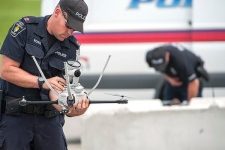
Over the past two years, Connecticut state lawmakers have launched several bills designed to regulate drones (even though the FAA trumps state law); however, none have passed so far. A bill to ban weaponized drones and require police to obtain a warrant before filming via drone died on the Senate floor last year.
Despite the failure of the state to muster support for drone laws, many chiefs are stuck in a wait-and-see mode. “The rules are changing so quickly. I would hate to invest in something and then not be able to use it,” said Groton City police Chief Thomas Davoren said in a recent Associated Press report.
Groton Town police Chief Louis J. Fusaro Jr. told the AP that drone use would save taxpayer funds over expensive helicopter flights, which can cost up to $1,500 an hour. However, his department has no plans to buy a drone until privacy and safety issues are addressed in more detail.
“There are definitely advantages, but the technology is relatively new,” he said. “Just like a lot of other things, the laws haven’t caught up to it.”
New laws may be an obstacle, but cost is not an issue for the Plainfield Police Department. Last year, an anonymous resident donated $10,000 to buy a DJI Inspire with thermal imaging sensors and high-def video. The gift came as pleasant but much-needed surprise to Capt. Mario Arriaga since the department had already kicked around the idea of buying a UAV.
“We just couldn’t afford it and we weren’t going to go to taxpayers for that kind of purchase,” Arriaga told the Norwich Bulletin.
Nationally, the police drone buzz is starting to reach the ears of professional police associations as well. Last year, the International Association of Chiefs of Police’s Aviation Committee released guidelines to its members concerning drone use. The group, which includes 20,000 law enforcement professionals from 100 countries, strongly advises member agencies to focus on privacy concerns within their jurisdictions.
Jason is a longstanding contributor to DroneLife with an avid interest in all things tech. He focuses on anti-drone technologies and the public safety sector; police, fire, and search and rescue.
Beginning his career as a journalist in 1996, Jason has since written and edited thousands of engaging news articles, blog posts, press releases and online content.
Email Jason
TWITTER:@JasonPReagan
Subscribe to DroneLife here.